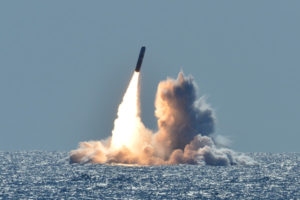The Council for a Livable World was among organizations who sent a letter to Senate Majority Leader Mitch McConnell May 4 asking him to reject the proposal in the 2018 Nuclear Posture Review for a new “low-yield” warhead for the Trident II D5 submarine-launched ballistic missile. “This new weapon is unnecessary and would increase the risk of miscalculation and wider nuclear
use.”
The full text of the letter is below:
May 4, 2018
The Honorable Mitch McConnell
United States Senate
Washington, DC 20510
Dear Senator McConnell,
We ask you to reject the proposal in the 2018 Nuclear Posture Review for a new “lowyield” warhead for the Trident II D5 submarine-launched ballistic missile. This new weapon is unnecessary and would increase the risk of miscalculation and wider nuclear use. The Administration’s FY2019 budget included $22.6 million in DoD funding and recently added $65 million in DOE funding for this weapon.
There are three reasons you should oppose this new weapon.
First, the Trump administration’s case for this new low-yield warhead rests on the faulty premise that there is a “deterrence gap” with Russia. Because of this supposed “gap,” the Nuclear Posture Review suggests that Russia might use a low-yield nuclear weapon first in a conflict and assume the United States would be “self-deterred” from responding because the Pentagon lacks sufficient low-yield nuclear options.
But there is no gap. The United States already deploys several types of B61 bombs and an air-launched cruise missile with low-yield options, totaling approximately 1,000 weapons in its arsenal. In addition, current plans call on the United States to invest more than $150 billion to field a new B61 bomb with low-yield options, a new cruise missile and warhead with low-yield options, as well as a new stealth bomber and fighter aircraft to deliver these weapons.
Second, in the highly unlikely event of a Russian limited nuclear attack, there is no evidence to suggest that a limited US nuclear counterstrike would end the conflict. In fact, such a response would increase the risk of further nuclear escalation.
As President Reagan’s Secretary of State George Shultz testified to Congress on January 25, 2018, “The idea of a low-yield nuclear weapon is kind of a mirage. It is a nuclear weapon… [It] invites escalation.”
Third, a low-yield warhead on a ballistic missile invites miscalculation. If Russia detected an incoming Trident missile, it would not know whether it was armed with a low-yield or high-yield warhead. Based on a worst-case scenario, it may feel pressured to respond quickly by launching a missile of its own, further increasing the risk of unintended nuclear escalation.
It was this same discrimination problem that led Congress to soundly reject the idea of deploying conventionally-armed Trident missiles in 2008. Congress was rightly concerned about the inability of nuclear-armed adversaries to determine whether a ballistic missile launched from a US submarine was armed with a conventional or nuclear warhead. If Russia detected an incoming missile, it would have to assume it could be nuclear-armed, which could lead it to launch a nuclear weapon in response.
When testifying before Congress on March 20, 2018, General Hyten, the commander of US Strategic Command, said, “I have everything I need today to deter Russia from doing anything against the United States of America. We’re fully ready against any threat that exists today, without a doubt.”
Based on that assessment, it is unclear why the Administration is seeking to fast-track the development of a low-yield warhead in FY2019.
We urge you to deny funding for the “low-yield” Trident warhead.
Sincerely,
Glenn Carroll, Coordinator
Nuclear Watch South
Jeff Carter, Executive Director
Physicians for Social Responsibility
Tom Collina, Director of Policy
Ploughshares Fund
Jay Coughlin, Executive Director
Nuclear Watch New Mexico
Lisbeth Gronlund, Co-Director and Senior Scientist
Global Security Program
Union of Concerned Scientists
Ralph Hutchinson, Coordinator
Oak Ridge Environmental Peace Alliance
Derek Johnson, Executive Director
Global Zero
Marylia Kelley, Executive Director
Tri-Valley CARES, Livermore CA
Daryl Kimball, Executive Director
Arms Control Association
David Krieger, President
Nuclear Age Peace Foundation
Hans Kristensen, Director Nuclear Information Project
Federation of American Scientists
Gerry Lee, Executive Director
Maryknoll Office for Global Concerns
Paul Kawika Martin, Senior Director Policy and Political Affairs
Peace Action
Stephen Miles, Director
Win Without War
Robert K. Musil, President & CEO
Rachel Carson Council
John Qua, Senior Campaigner
Beyond the Bomb
Guy Quinlan, President
Lawyer’s Committee on Nuclear Policy
Becky Rafter, Executive Director
Georgia WAND
Laura Skelton, Executive Director
Washington Physicians for Social Responsibility
John Tierney, Executive Director
Council for a Livable World
Cassandra Varanka, Nuclear Weapons Policy Coordinator
Women’s Action for New Directions
Anthony Wier, Legislative Secretary Nuclear Disarmament & Pentagon Spending
Friends Committee on National Legislation

